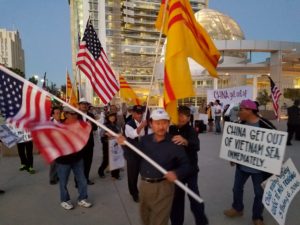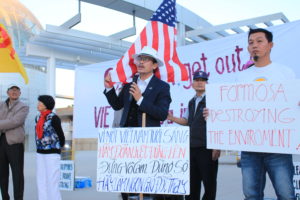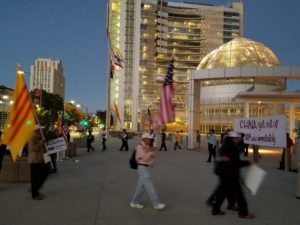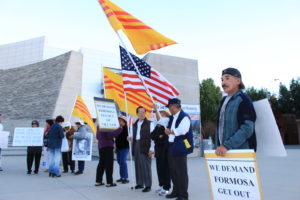Taiwan’s Formosa Plastics Group admitted to releasing toxins that killed more than 100 tons of fish along the north-central Vietnam coast; San Jose protesters want the government to kick Formosa out of Vietnam. They fear Vietnamese dependent on fishing and the sea will starve.
By Sharon Simonson

SAN JOSE—They march in a big circle holding South Vietnamese and American flags, singing in Vietnamese, a portable amplifier broadcasting the music, crackly and loud. The long Northern California summer day is ending, but at evening, sunlight still fills the San Jose City Hall plaza.
Fifty people today, but some weeks, hundreds march at the corner abutting busy Santa Clara and Fourth streets, organizers assure me. It’s the eighteenth consecutive Saturday that they’ve protested the April poisoning of more than 100 tons of fish along Vietnam’s north-central coast. In June Taiwan’s Formosa Plastics Group admitted causing the disaster and pledged $500 million in reparations. As of Sept. 1, the Vietnamese government has tendered no aid to the people, according to Radio Free Asia, a U.S.-funded news service. San Jose marchers allege that communist government officials in Vietnam have pocketed the Formosa money; they fear Vietnamese people reliant on fishing and the sea will starve.
The massive fish kill underlines horribly what the San Jose protesters have experienced, said and believe, in some cases for more than 40 years: The Vietnamese government is deeply corrupt, controlled by Asia’s communist hegemon and has no regard for life or property. They “sell the forests and the sea to China,” 75-year-old Thau Nguyen of San Jose, a Vietnam war veteran and concentration camp survivor, tells me.
By protesting in San Jose—and most importantly posting protest photos on Facebook, which 35 million Vietnamese, a third of the country, use—participants seek to inspire a global Vietnamese movement. They want the Vietnamese to continue to protest and demand accountability from their government; the San Jose demonstration began at the exact same time as counterparts in Vietnam. They also seek solidarity with Vietnamese-Americans across the United States. Organizers just returned from meeting with Vietnamese-Americans in Orange County and are corresponding with Vietnamese-Americans in Portland, Ore.

With four decades of residency and 10 percent of San Jose’s population—more than 100,000 people—the Vietnamese are the largest Asian group in the city. But they reside largely outside of the community’s cultural mainstream. Sixty percent of the Vietnamese people living in San Jose don’t speak English very well. The city of San Jose—with the largest Vietnamese and Vietnamese-American population in the country—still does not translate its records. A steady supply of newspaper and television news about Vietnam in Vietnamese ties people to that country even when they have lived in the United States for years. For the larger San Jose and Silicon Valley populations, the Vietnamese and their concerns can seem a small, distant island.
Yet Formosa Plastics, a notorious polluter, operates globally including in the United States. One of its chemical plants in Illiopolis, Ill., blew up in 2004, killing five workers and badly injuring several more. In 2009, the company agreed to pay $13 million, to upgrade two Texas and Louisiana petrochemical plants and in fines for violating the Clean Air Act, the Clean Water Act, the Resource Conservation and Recovery Act and other infractions. The company bought 165 homes in Port Comfort, Texas, in the late 1990s after residents alleged it had so polluted the air, land and water that their homes were uninhabitable. Their environmental record is so bad that Wallace, La., a poor and primarily African-American community refused in 1993 to let Formosa build a plant that would have employed 1,000 people full-time.

The Saturday protesters are familiar fixtures at Vietnamese community events: an older Vietnamese woman with a coat and a fleece hat that includes earflaps; an elegant lady with a knit scarf of the Vietnamese flag around her neck; San Jose Councilman Tam Nguyen, who translates much of Saturday’s event into English; 69-year-old Truong Vu, with his soulful eyes and searching demeanor, vice chair of the newly formed Vietnamese-American Community Coalition of Northern California. “It’s not just about Vietnam, it’s about the whole earth,” Vu tells me.
The San Jose protesters arrange themselves in a semicircle with Councilman Nguyen at 90 degrees. A man to Nguyen’s right removes his cap with a flourish and places it over his heart. “The Star-Spangled Banner” begins to play. Everyone is somber; no one sings. People hold the exact same number of South Vietnamese flags as American flags. The anthem ends. “Let’s have a moment of silence for our soldiers who lost their lives fighting for freedom and democracy, for the 58,000 U.S. soldiers who sacrificed their lives for our country, and especially for those who suffer now in Vietnam,” Tam Nguyen says.
The Vietnamese national anthem plays, and everyone sings. Later when they march in the circle, they chant: “Formosa, out of Vietnam!” “China, out of Vietnam!” “Communists, out of Vietnam!”
They sing a spirited rendition of “Proud of Vietnam,” a song, marchers tell me, that all of their countrymen and -women know. They dream of a time—indeed are working for the day—when Vietnamese-American communities nationwide wield enough political clout to gain Washington’s attention to help compel change in Vietnam.

Thirty-four-year-old Jack Duong of Newark arrived to downtown San Jose early Saturday to hang posters. He wears jeans and a new white t-shirt, tucked in, with graphics on the front depicting the South Vietnamese flag and a dead fish. It is the Vietnam-native’s fifteenth week of marching. “The people in Vietnam must rise up against the government to bring Formosa to international court and kick them out of Vietnam,” Duong says. He acknowledges that 50 marchers are not enough to effect change: “We need thousands to make it work.”
But Thau Nguyen is undaunted. Before the Saturday march starts, he shows me photos on his iPad from the day before when he protested in San Francisco against that city’s use of the hated yellow-star, red-field flag of today’s Vietnam. “How is your life in the United States?” I ask him. “It’s O.K.,” he replies. “My wife is anti-communist too.”
Many Thanks for reporting! Keep up your good works.
Thanks for the report Sharon!!! We, Vietnamese people, appreciated!!
This environmental disaster is not a Vietnamese or Chinese or Taiwanese problem. It’s a crime against nature and humanity. Polluting toxins are being fed to our children through the foods imported from the affected areas. We, therefore, must speak out against it, and demand our government to take appropriate actions to stop the import of poisonous foods, and prevent further disasters. Thank you Sharon for your article which gives voice to the people and brings attention to this critical issue of protecting the environment. -TN
Sharon’s fulls of details article is a great gift to our homeland people.
On behalf of our poor people who crying since the death of their sea, we thank you very very much Sharon!!!
Amy Duong